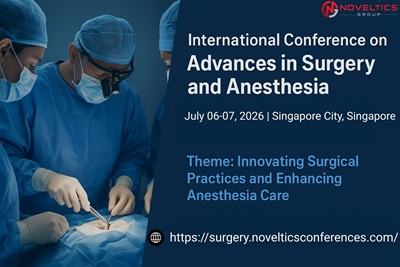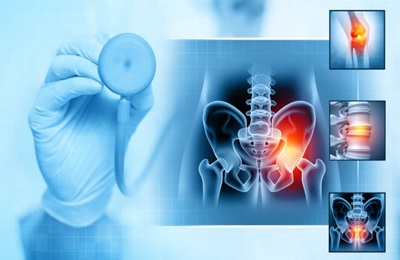Session 01: General Surgery Innovations
General surgery forms the cornerstone of modern healthcare, addressing a wide range of conditions through advanced surgical procedures. This track will highlight minimally invasive techniques, robotic-assisted surgery, and enhanced perioperative care. Experts will discuss recent clinical trials, technological innovations, and improved surgical workflows. Attendees will gain insights into how precision surgery combined with optimized anesthetic techniques improves recovery, reduces hospital stays, and enhances patient safety.
Session 02: Anesthesia and Perioperative Medicine
Safe anesthesia practice is fundamental to every surgery. This track will explore advances in general, regional, and local anesthesia, alongside enhanced recovery protocols. Topics include patient monitoring, anesthesia in complex cases, and innovations in perioperative care. Presentations will emphasize multimodal analgesia, reducing opioid dependency, and preventing anesthesia-related complications.
Session 03: Orthopedic Surgery & Trauma Care
Orthopedic surgery continues to evolve with advances in joint replacement, arthroscopy, and trauma management. This track will cover surgical techniques for fractures, sports injuries, and degenerative disorders. Anesthesia considerations for trauma and orthopedic patients will be highlighted, particularly in high-risk or emergency settings. Experts will share best practices in pain management, rehabilitation, and the role of regional anesthesia in postoperative care. Cutting-edge technologies such as 3D printing, robotics, and AI in orthopedic surgery will also be discussed.
Session 04: Cardiothoracic Surgery & Anesthesia
Cardiothoracic surgery demands precision and advanced anesthetic support. This track will focus on heart surgeries, lung resections, and thoracic trauma procedures. Presentations will cover cardiopulmonary bypass, minimally invasive cardiac techniques, and anesthesia challenges in high-risk cardiovascular patients. Anesthesiologists will share insights on hemodynamic monitoring, intraoperative management, and novel strategies to reduce perioperative complications. Key themes include heart valve repair, congenital heart disease, and thoracic oncology surgeries.
Session 05: Neurosurgery & Neuroanesthesia
This track delves into the complexities of brain and spinal surgeries, where anesthesia plays a pivotal role. Topics include tumor resections, functional neurosurgery, epilepsy surgeries, and minimally invasive spine procedures. Neuroanesthesiology sessions will cover intraoperative monitoring, awake craniotomy techniques, and strategies to maintain cerebral perfusion. Discussions will also focus on innovations in imaging, navigation systems, and robotic-assisted neurosurgery.
Session 06: Pediatric Surgery & Anesthesia
Children undergoing surgery require specialized care. This track will highlight advancements in pediatric surgical procedures, from congenital anomalies to minimally invasive techniques. Pediatric anesthesia poses unique challenges due to physiological differences, and experts will discuss age-specific anesthetic strategies, safety protocols, and perioperative pain management. Topics will also cover neonatal surgeries, pediatric trauma, and innovations in pediatric critical care. Emphasis will be placed on reducing complications, improving recovery, and enhancing patient comfort.
Session 07: Plastic & Reconstructive Surgery
Plastic and reconstructive surgery combines artistry with surgical skill to restore form and function. This track will cover craniofacial reconstruction, burn surgery, hand microsurgery, and aesthetic enhancements. Anesthesia management in prolonged reconstructive procedures will be emphasized, highlighting safety and patient monitoring. Experts will discuss innovations such as regenerative medicine, fat grafting, and 3D-printed implants. The track will also address post-surgical pain management and recovery optimization.
Session 08: Minimally Invasive & Robotic Surgery
Minimally invasive surgery has transformed patient care by reducing complications and recovery times. This track will explore laparoscopic, endoscopic, and robotic-assisted procedures across specialties. Anesthesia in minimally invasive procedures requires careful adaptation, particularly in managing airway and positioning challenges. Presenters will discuss surgical simulation training, AI integration, and improved visualization systems. Key themes include cost-effectiveness, patient safety, and enhanced precision in surgical interventions.
Session 09: Bariatric & Metabolic Surgery
Bariatric surgery offers life-changing benefits for patients with obesity and metabolic disorders. This track will focus on surgical techniques such as gastric bypass, sleeve gastrectomy, and revisional procedures. Anesthesia in obese patients presents unique challenges, including airway management and dosing considerations. Sessions will cover perioperative care, long-term metabolic outcomes, and enhanced recovery pathways. Experts will share insights on patient selection, psychological support, and managing comorbidities.
Session 10: Transplant Surgery & Anesthesia
Transplantation remains one of the most challenging areas of surgery, requiring meticulous coordination. This track will focus on kidney, liver, lung, and heart transplants. Anesthesia plays a critical role in managing high-risk patients with organ failure and ensuring successful graft outcomes. Experts will discuss innovations in organ preservation, immunosuppression, and perioperative critical care. Topics include donor-recipient matching, surgical techniques, and post-transplant complications.
Session 11: Gastrointestinal & Colorectal Surgery
Gastrointestinal surgery addresses conditions from hernias to complex colorectal cancers. This track will highlight laparoscopic and open techniques, enhanced recovery pathways, and perioperative care. Anesthetic management in GI surgeries involves unique considerations such as fluid balance and multimodal analgesia. Experts will present on innovations in cancer surgery, inflammatory bowel disease management, and sphincter-preserving procedures. Attendees will explore how anesthesiologists and surgeons collaborate to minimize complications, accelerate recovery, and improve quality of life.
Session 12: Obstetrics & Gynecologic Surgery
Gynecologic and obstetric surgeries require specialized surgical and anesthetic expertise. This track will focus on procedures such as cesarean sections, hysterectomies, and laparoscopic gynecology. Anesthesiologists will present on regional blocks, pain management, and anesthesia in high-risk pregnancies. Discussions will also include fertility-preserving surgeries, oncogynecology, and advances in minimally invasive techniques. Patient safety, enhanced recovery, and maternal health outcomes will be central themes.
Session 13: Vascular Surgery & Anesthesia
Vascular surgery addresses diseases of arteries, veins, and lymphatics. This track will cover aneurysm repair, carotid interventions, and endovascular therapies. Anesthesia considerations are crucial due to hemodynamic changes and the need for precise monitoring. Sessions will highlight advances in stent grafts, minimally invasive vascular procedures, and perioperative anticoagulation strategies.
Session 14: Head & Neck Surgery with Anesthetic Approaches
Head and neck surgeries, including oncology and reconstructive procedures, demand precision and close anesthetic support. This track will explore airway management strategies, complex tumor resections, and microsurgical reconstructions. Anesthesia considerations include difficult airway cases, prolonged surgeries, and managing comorbidities. Experts will highlight perioperative care, pain management, and enhanced recovery techniques.
Session 15: Ophthalmic Surgery & Anesthesia
Ophthalmic surgery requires delicate techniques and tailored anesthesia. This track will highlight cataract surgery, corneal transplantation, retinal interventions, and oculoplastic procedures. Experts will discuss the role of topical, regional, and general anesthesia in ophthalmology. Patient safety, pain management, and innovations in microsurgical techniques will be key themes. Attendees will also explore advances in laser-assisted procedures, robotic ophthalmology, and perioperative protocols for high-risk patients.
Session 16: Surgical Oncology & Anesthesia
Cancer surgery remains one of the most challenging areas of healthcare. This track will cover tumor resections, limb salvage surgeries, and organ-sparing procedures. Anesthesia plays a critical role in oncology, particularly in managing pain and ensuring perioperative safety in immunocompromised patients. Experts will present on enhanced recovery, multimodal analgesia, and minimizing complications.
Session 17: Urological Surgery & Anesthesia
Urology surgeries address kidney, bladder, and prostate disorders. This track will cover minimally invasive urology, robotic prostatectomies, and kidney stone management. Anesthesia considerations in urology involve fluid management, positioning, and regional blocks. Sessions will highlight enhanced recovery pathways, reducing complications, and improving perioperative safety.
Session 18: Emergency & Trauma Surgery
Emergency and trauma surgery is a critical discipline requiring immediate decision-making and surgical precision. This track will focus on surgical interventions for severe injuries, bleeding control, and organ repair. Anesthesia in trauma cases presents challenges such as unstable patients and rapid response needs. Experts will share insights into airway management, fluid resuscitation, and perioperative critical care. Sessions will highlight advances in trauma systems, simulation training, and surgical innovations that improve survival in emergency situations.
Session 19: Pain Management & Regional Anesthesia in Surgery
Effective pain control is essential for recovery after surgery. This track will focus on regional anesthesia techniques, multimodal analgesia, and chronic pain management strategies. Experts will discuss nerve blocks, epidurals, and ultrasound-guided techniques to optimize pain control and reduce opioid dependence. Topics will also cover patient-tailored anesthesia, perioperative monitoring, and innovations in pharmacology.
Session 20: Surgical Education & Simulation
Training future surgeons and anesthesiologists requires innovation in education. This track will highlight simulation-based learning, virtual reality platforms, and surgical skill assessment. Experts will discuss curriculum development, competency-based training, and global standards in surgical education. Anesthesia training will also be emphasized, focusing on crisis management and perioperative teamwork.
Session 21: Global Surgery & Anesthesia
Surgical and anesthesia care face disparities worldwide. This track will focus on improving access, affordability, and quality of surgical services in low- and middle-income countries. Experts will discuss global surgery initiatives, workforce training, and sustainable anesthesia practices. Topics include mobile surgical units, telemedicine integration, and policy-making to reduce surgical inequities. Case studies will highlight collaborative international efforts to strengthen surgical systems globally.
Session 22: Future of Surgery & Anesthesia
The future of surgery lies in precision, digital innovation, and multidisciplinary collaboration. This track will explore artificial intelligence, nanotechnology, robotics, and smart anesthesia delivery systems. Experts will discuss innovations in surgical navigation, augmented reality, and personalized anesthetic protocols. Attendees will gain insights into how digital healthcare, predictive analytics, and regenerative medicine will transform perioperative care.
Session 23: Critical Care, Geriatric & Ambulatory Surgery
This track focuses on surgical and anesthetic management of high-risk patients in ICUs, elderly populations, and ambulatory/day-care surgeries. Experts will highlight anesthesia challenges in geriatric surgery, including comorbidities, frailty, and postoperative delirium. Sessions will also cover ICU care led by anesthesiologists, perioperative monitoring, and enhanced recovery protocols. Ambulatory surgery is gaining momentum worldwide, and discussions will emphasize safe anesthesia practices, rapid recovery, and patient-centered care.
Session 24: Anesthesia Pharmacology & Drug Development
Advances in pharmacology continue to reshape anesthesia practice. This track will explore novel anesthetic agents, precision dosing strategies, and pharmacogenomics. Sessions will cover drug safety, monitoring depth of anesthesia, and multimodal analgesic regimens. Experts will also discuss the reduction of opioid dependency, use of regional anesthesia adjuvants, and innovative drug delivery systems. Clinical trials and emerging research on new anesthetic agents will be highlighted.


















